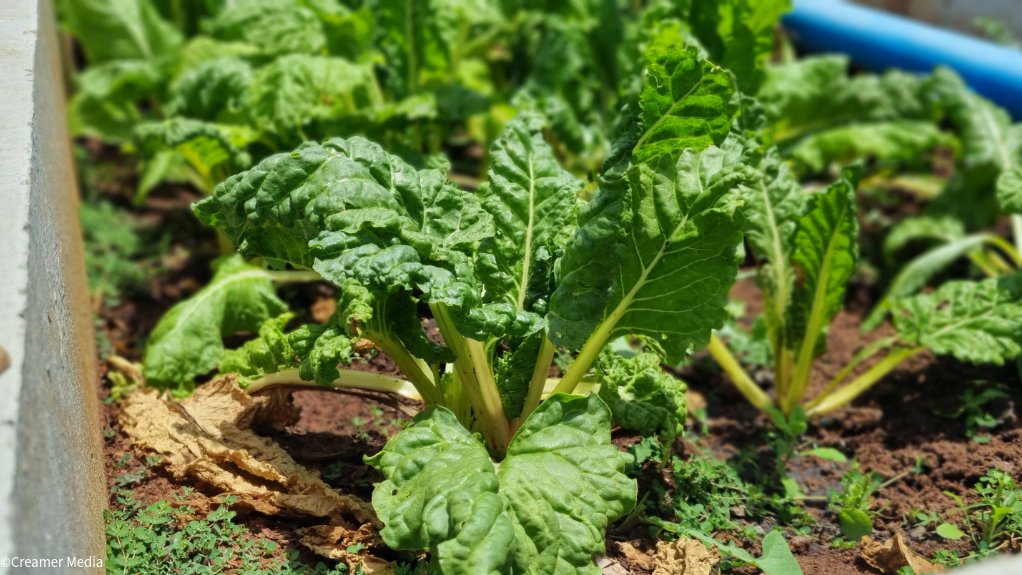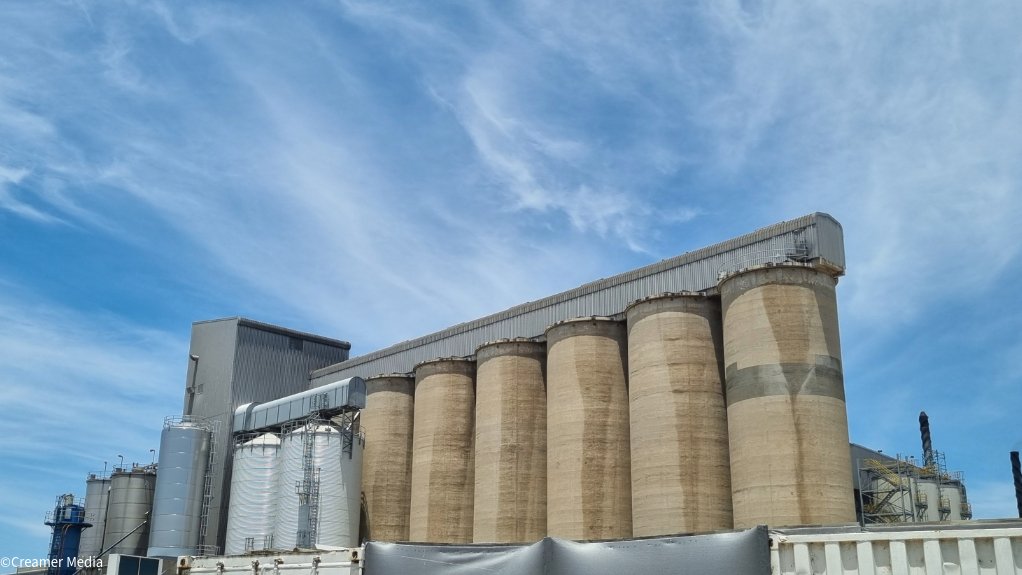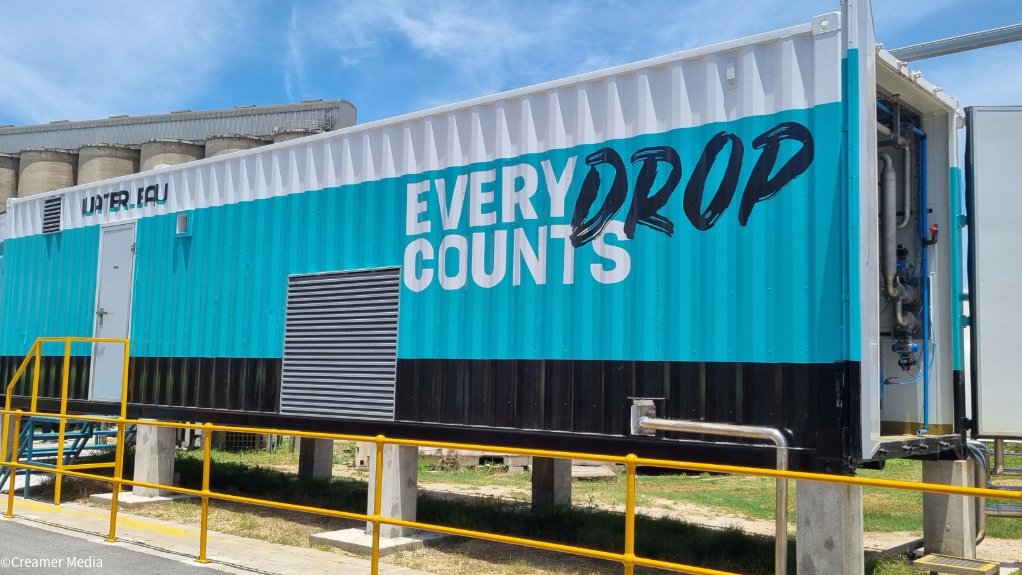Partnership project showcases value-creating effluent treatment process at Eastern Cape brewery




Spinach produced in raise beds at SAB Ibhayi brewery
Photo by Creamer Media's Marleny Arnoldi
SAB Ibhayi brewery
Photo by Creamer Media's Marleny Arnoldi
Waterleau ultrafiltration modular system
Photo by Creamer Media's Marleny Arnoldi
Project Imifino was recently showcased at South African Breweries' (SAB’s) Ibhayi brewery site in Gqeberha in the Eastern Cape as a viable model for effluent treatment in the food and beverage sector at industrial scale, including providing irrigation for agricultural purposes.
This followed on the installation and commissioning of an innovative containerised ultrafiltration (UF) system to enhance the existing capabilities of Imifino, with grant funding and technical assistance from the Flanders-funded South African Industry Adaptation (SAIA) project. The SAIA project is jointly implemented by the United Nations Industrial Development Organization (Unido) with the National Cleaner Production Centre South Africa and the Technology Innovation Agency.
The Imifino project applies a circular economy approach using a green biological effluent treatment system. It integrates agricultural production with effluent treatment, effectively creating a profitable and sustainable local value chain from brewery wastewater while producing water for direct onsite re-use by the brewery.
Initially launched in 2020 as a partnership between TaylorMade Solutions director Dr Richard Taylor and SAB parent company ABInBev, Imifino was selected for support by the SAIA project in March 2022. With SAIA grant funding, TaylorMade Water Solutions was able to procure a modular containerised UF system, which was co-financed, designed and built by Flemish technology company Waterleau.
The water treatment process starts with effluent from SAB’s anaerobic digestors being filtered through an aerated constructed wetland before undergoing ultrafiltration through the new UF system. The UF system enables the treatment of at most 250 m3 wastewater per day for direct onsite re-use by the brewery, thereby also contributing to water security for the surrounding communities. The recycled water that is circulated back to the brewery is mostly used for condensers, boilers, bottle washers, crate washers, ablutions and pasteurisers in the brewery.
The ultrafiltration process provided by Waterleau comprises a filter pore size of 0.04 microns, which removes viruses, bacteria and suspended solids from the effluent. It is fully automated, scalable, easily installable and safely operatable by anyone with appropriate training.
Commissioned in September this year, the ultrafiltration plant produced 4 700 m3 of reusable water in November – enough to fill two Olympic-sized swimming pools.
The treatment of effluent typically involves high energy consumption, the production of waste sludge, carbon emissions and costly processes, which are all mitigated through the Imifino project.
Additionally, Taylor said the process allows for the recovery of valuable nutrients from effluent, which negates the environmental impacts associated with using fertiliser.
He explained that the Imifino project was born from research between Ibhayi brewery and Rhodes University in 2008, with the research team having used high-rate algal ponding and wetland technology to recover water from the brewery’s effluent. This was expanded in 2021 through the addition of an aeration system that allows for the cultivation of crops.
The project now comprises 2 000 m2 of raised beds growing crops such as spinach, parsley and spring onion.
The site produces 1 500 kg of packed spinach every month, which is sold to local retailers.
The project has created eight jobs since its inception, notably for low-skilled people.
Taylor said the Imifino model is replicable to more industrial sites in South Africa, particularly those using anaerobic digestors in its manufacturing or water treatment process.
He said more effluent treatment sites such as Imifino could ensure better use of water, energy and other resources on industrial sites, as well as advance more agricultural developments.
SAIA PROJECT
The SAIA project focused on the energy and water nexus to improve circularity and efficiencies in medium-sized to large enterprises in the agro-processing sector, also involving strategic partnerships with academia, knowledge institutions and umbrella organisations to ensure that the learnings through the project are shared, scaled up and sustained.
SAIA uses an organic, holistic approach to climate adaptation, which is essential for economic resilience.
In addition to its support to pilot projects and local innovators with industry-focused solutions, the SAIA partners developed a decarbonisation roadmap, and an Energy and Water Baseline and Best Practice guideline for the agroprocessing industry, particularly the brewery, fruit and vegetable, poultry and sugarcane sectors.
Karin Reiss-Haimbala, industrial development officer from Unido’s headquarters in Vienna overseeing the implementation of the SAIA project, highlighted that climate resilience in the industrial context means the capacity to absorb stresses imposed by climate change and maintain productive functions. It also means adapting, renewing, reorganising and developing desirable pathways to help industries better prepare for future climate-change impacts while preserving natural resources.
Flanders deputy general representative of the delegation of Flanders in Southern Africa Dr Nicolas Vandeviver said the SAIA project was a model for sustainable industrial development. “Through supporting pilot projects such as the Imifino project, it has shown how innovative practices – such as reusing wastewater to grow crops – can create jobs, promote skills development and add value to local communities.”
Unido regional representative for Southern Africa Dr Diego Masera said that the project was a testament to what could be achieved when academia, industry, and government come together with a shared vision for a greener, more resilient future. “It reflects our commitment to supporting South Africa’s transition to a green economy, decarbonized industry, and vibrant job market while addressing the interconnected challenges of water, energy, and food security,” he concluded.
Department of Trade, Industry and Competition (dtic) green industries director Gerhard Fourie said decarbonisation efforts allowed for opportunities to add value to the economy and the creation of jobs.
He confirmed that the dtic planned to publish a draft Decarbonisation Strategy before the end of the 2025 financial year to guide industries in South Africa on various environmental objectives while ensuring competitiveness.
Mchenge Nyoka, South Africa national project coordinator, said the partners were discussing a four-year follow-on project that would build on and expand the learnings from the SAIA project.
The focus of the second phase, which may start early next year, will be on industrial spaces, as they have high potential to become green energy zones focusing on the clean energy supply and manufacturing of clean energy technologies.
IBHAYI BREWERY
The SAB Ibhayi brewery was built in 2000, with a new production line having been added in 2018. The site produces the Castle Lager, Carling Black Label, Hansa Pilsner, Castle Milk Stout, Castle Lite, Lion Lager, Flying Fish and Redds brands of alcoholic beverages.
The 180 598 m2 site brews 70 000 hectolitres of beer a week or between 2.9-million and 3.4-million hectolitres a year.
SAB’s parent group Anheuser-Busch InBev's sustainability goals include purchasing 100% of its electricity from renewable sources and reducing carbon emissions by 25% across the value chain by 2025 – including by capturing and storing carbon through nature-based solutions.
Ninety-eight per cent of its products across the group are in packaging that is returnable or made from majority recycled content, while more circularity projects are under way at various sites to manage waste generated on site.
Marleny Arnoldi was a guest of Unido South Africa in Gqeberha visiting SAB's Ibhayi brewery on December 4.
Article Enquiry
Email Article
Save Article
Feedback
To advertise email advertising@creamermedia.co.za or click here
Press Office
Announcements
What's On
Subscribe to improve your user experience...
Option 1 (equivalent of R125 a month):
Receive a weekly copy of Creamer Media's Engineering News & Mining Weekly magazine
(print copy for those in South Africa and e-magazine for those outside of South Africa)
Receive daily email newsletters
Access to full search results
Access archive of magazine back copies
Access to Projects in Progress
Access to ONE Research Report of your choice in PDF format
Option 2 (equivalent of R375 a month):
All benefits from Option 1
PLUS
Access to Creamer Media's Research Channel Africa for ALL Research Reports, in PDF format, on various industrial and mining sectors
including Electricity; Water; Energy Transition; Hydrogen; Roads, Rail and Ports; Coal; Gold; Platinum; Battery Metals; etc.
Already a subscriber?
Forgotten your password?
Receive weekly copy of Creamer Media's Engineering News & Mining Weekly magazine (print copy for those in South Africa and e-magazine for those outside of South Africa)
➕
Recieve daily email newsletters
➕
Access to full search results
➕
Access archive of magazine back copies
➕
Access to Projects in Progress
➕
Access to ONE Research Report of your choice in PDF format
RESEARCH CHANNEL AFRICA
R4500 (equivalent of R375 a month)
SUBSCRIBEAll benefits from Option 1
➕
Access to Creamer Media's Research Channel Africa for ALL Research Reports on various industrial and mining sectors, in PDF format, including on:
Electricity
➕
Water
➕
Energy Transition
➕
Hydrogen
➕
Roads, Rail and Ports
➕
Coal
➕
Gold
➕
Platinum
➕
Battery Metals
➕
etc.
Receive all benefits from Option 1 or Option 2 delivered to numerous people at your company
➕
Multiple User names and Passwords for simultaneous log-ins
➕
Intranet integration access to all in your organisation





















